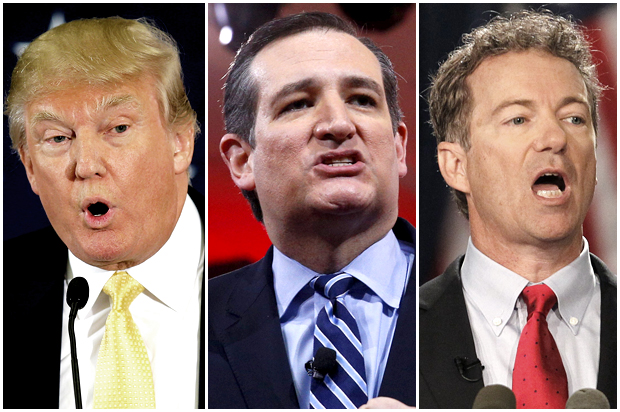Extremists on both ends of the political spectrum have plenty of things in common. Ideologues of all stripes have a tendency to distort the truth in similar ways – and any honest observer can see that. But there are crucial differences between Republicans and Democrats in this country, differences that transcend policy differences and have almost nothing to do with material conditions.
Perhaps the most significant difference is how liberals and conservatives view the idea of government. Most liberals believe that government is not just necessary but essential, and therefore it ought to work as well as possible. Conservatives, on the other hand, believe that government as such is the problem; that it’s a necessary evil at best. This is not true of classical conservatives, but the modern Right, in all its forms, regards the state as the enemy.
This is arguably the deepest ideological fault line in American politics today.
What’s interesting, though, is how unevenly this divide manifests itself. You would expect generic opinions about the utility and trustworthiness of government to hold constant for the most part, and that minor shifts in either direction would be easily explainable in terms of partisan allegiances.
But a new Pew Research Poll (conducted between August 27 and October 4, 2015) analyzing how Americans view their government yielded some fascinating – although not terribly surprising – results. The study found that Republicans “are nearly three times as likely as Democrats to say they are angry with the government. And among politically engaged Republicans and Democrats – those who vote frequently and follow politics on a regular basis – the gap is nearly four-to-one (42% to 11%).”
This could be explained away as nothing more than an indictment of Obama’s record, but the data over time is more complicated than that.
It’s true that there’s a partisan divide over the proper size and scope of the government. 80 percent of Republicans, for example, think the government should be smaller and do less; roughly 69 percent of Democrats say the opposite. But the public’s general feelings about the government are far more inconsistent than you’d anticipate.
For instance, according to the Pew study, “Among both Democrats and Republicans, large majorities say they can seldom, if ever, trust the federal government (89% of Republicans, 72% of Democrats). While trust in government among Republicans has varied widely depending on whether a Republican or a Democrat is in the White House, Democrats’ views have shown far less change.”
The immediate takeaway from this is that liberal Democrats are more ideologically coherent than conservative Republicans. That is to say, conservatives’ view of the government has more to do with partisanship than fundamental principles. Although Democrats tend to trust the government more during Democratic administrations, the difference is negligible compared to Republicans, whose views vary sharply from administration to administration. As the report notes, “Republicans are much more reactive than Democrats to changes in political power…while Democrats’ attitudes tend to be more consistent, regardless of which party controls the White House.”
Trust levels across the Bush and Obama administrations is perhaps the most striking and revealing finding in the report. The following quote sums it up well:
“In Barack Obama’s six years as president, 13% of Republicans, on average, have said they trust the government always or most of the time – the lowest level of average trust among either party during any administration dating back 40 years. During George W. Bush’s presidency, an average of 47% of Republicans said they could trust the government. By contrast, the share of Democrats saying they can trust the government has been virtually unchanged over the two administrations (28% percent Bush, 29% Obama).”
The shift in Republican views toward government from Bush to Obama is a reflection of rank partisanship, and nothing else. If Republicans were genuinely concerned about the size of the government or about encroachments upon individual liberty, there would be no reason to trust the Bush administration any more than the Obama administration. The Patriot Act, the massive and illegal global surveillance program, the Wall Street bailout, the torture program, the Iraq War propaganda – all of this occurred during Bush’s tenure. On almost every front, Obama has either continued Bush’s policies or tried desperately to clean up the mess he left behind.
And yet Republicans were mostly unconcerned about these things until Barack Obama entered the White House. Now they’re worried about the size of the state; now they’re suspicious of federal power; now they’re troubled by the exploding budget; now they want to rein everything in.
The Pew findings confirm that the Republicans, on the whole, aren’t animated by consistent principles. They’re guided by false narratives and a conservative media invested in their anger. It doesn’t matter what Obama does or doesn’t do – conservatives will distrust him and virtually any other Democrat no matter what the results of their policies. The facts are largely irrelevant.
Democrats, on average, object to the policies of Republican administrations, but they continue to trust the government in general over time. Republicans, on the other hand, become anti-statists the minute a Democrats takes office. If nothing else, this says something significant about the differences between conservatives and liberals.
Liberal Democrats may be wrong on a number of issues, but at least their attitudes follow logically from their principles. The same can’t be said of conservative Republicans, however. And the latest Pew study is quite clear about that.

